A think tank, or policy institute, is a research institute that performs research and advocacy concerning topics such as social policy, political strategy, economics, military, technology, and culture. Most think tanks are non-governmental organizations, but some are semi-autonomous agencies within government or are associated with particular political parties or businesses. Think-tank funding often includes a combination of millionaire donations and individual contributions, with many also accepting government grants.

The National Endowment for Democracy (NED) is a U.S. non-governmental and non-profit organization that was founded in 1983 with the stated goal of promoting democracy abroad. It is funded primarily through an annual allocation from the U.S. Congress in the form of a grant awarded through the United States Information Agency (USIA). It was created by The Democracy Program as a bipartisan, private, non-profit corporation, and in turn acts as a grant-making foundation. In addition to its grants program, NED also supports and houses the Journal of Democracy, the World Movement for Democracy, the International Forum for Democratic Studies, the Reagan–Fascell Fellowship Program, the Network of Democracy Research Institutes, and the Center for International Media Assistance.
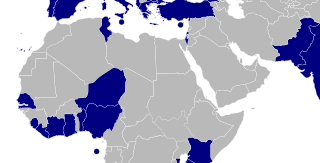
According to the Democracy Index 2016 study, Israel is the only democracy in the Middle East, while Tunisia is the only democracy in North Africa. The measure of the level of democracy in nations throughout the world published by Freedom House and various other freedom indices, the Middle Eastern and North African countries with the highest scores are Israel, Tunisia, Turkey, Lebanon, Morocco, Jordan and Kuwait. Countries that are occasionally classified as partly democratic are Egypt and Iraq. The remaining countries of the Middle East are categorized as authoritarian regimes, with the lowest scores held by Saudi Arabia and Yemen.
The Washington Institute for Near East Policy is an American pro-Israel think tank based in Washington, D.C., focused on the foreign policy of the United States in the Near East. It was established in 1985 with the support of AIPAC and the funding of many AIPAC donors, in order to provide higher quality research than AIPAC's publications. The institute's mission statement says that it seeks "to advance a balanced and realistic understanding of American interests in the Middle East and to promote the policies that secure them."

The Centre for Democracy and Development (CDD) was established in the United Kingdom in 1997 and subsequently registered in Lagos, Nigeria, in 1999. The organisation aims to promote the values of democracy, peace and human rights in Africa, particularly in the West African sub-region.

The German Marshall Fund of the United States (GMF) is a nonpartisan American public policy think tank and grantmaking institution dedicated to promoting cooperation and understanding between North America and Europe.
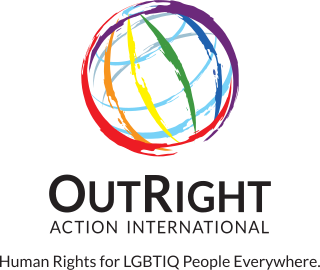
OutRight Action International (OutRight) is a LGBTIQ human rights non-governmental organization that addresses human rights violations and abuses against lesbian, gay, bisexual, transgender and intersex people. OutRight Action International documents human rights discrimination and abuses based on their sexual orientation, gender identity, gender expression and sex characteristics in partnership with activists, advocates, media, NGOs and allies on a local, regional, national and international level. OutRight Action International holds consultative status with ECOSOC.
Ryan Streeter is a public policy entrepreneur, researcher, professor, and author. He is currently Director of Domestic Policy Studies at the American Enterprise Institute. He was formerly Executive Director of the Center for Politics and Governance at the University of Texas at Austin, a senior policy adviser to Indiana Governor Mike Pence, a senior fellow at the Legatum Institute, Editor of ConservativeHomeUSA, and Vice President of Civic Enterprises, a public policy firm in Washington, D.C. Streeter was previously a Nonresident Transatlantic Fellow of the German Marshall Fund, a Distinguished Visiting Fellow at the Sagamore Institute, a Nonresident Scholar at the Institute for the Study of Religion at Baylor University, and an adjunct fellow at Hudson Institute. Streeter specializes in public policy and initiatives focused on strengthening communities, promoting growth, and supporting policy innovation. He has authored Transforming Charity: Toward a Results-Oriented Social Sector and co-authored The Soul of Civil Society, along with numerous articles. His case study on Indianapolis’ urban revitalization efforts is featured in Stephen Goldsmith’s book, Putting Faith in Neighborhoods, and he is editor of Religion and the Public Square in the 21st Century.
Democracy promotion, which can also be referred to as democracy assistance, democracy support, or democracy building, is a strand of foreign policy adopted by governments and international organizations that seek to support the spread of democracy as a political system around the world. Among the reasons for supporting democracy include the belief that countries with a democratic system of governance are less likely to go to war, are likely to be economically better off and socially more harmonious.

The Tharwa Foundation is a nonprofit, nonpartisan grassroots organization that encourages diversity, development and democracy in Syria and the broader Middle East/North Africa. The Foundation derives its name from the Arabic word, tharwa. Founded in 2003, the Tharwa Foundation is an offshoot of the Tharwa Project, an initiative launched in Damascus Syria by Ammar Abdulhamid and Khawla Yusuf. Abdulhamid is a blogger, human rights activist and author. Yusuf is an author, politician, and human rights activist.
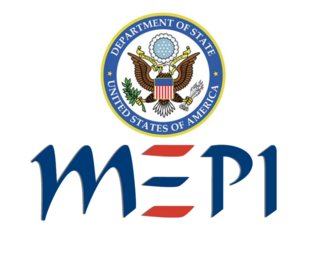
The U.S.-Middle East Partnership Initiative (MEPI) is a United States State Department program that fosters meaningful and effective partnerships between citizens, civil society, the private sector, and governments in the Middle East and North Africa (MENA) region to resolve local challenges and promote shared interests in the areas of participatory governance and economic opportunity and reform.
Media development involves capacity building for institutions or individuals related to freedom of expression, pluralism and diversity of media, as well as transparency of media ownership. Media development plays a role in democracy and effective democratic discourse through supporting free and independent media.

Thomas O. Melia currently serves as Washington Director at PEN America. Previously, he served in the Obama Administration as USAID's Assistant Administrator for Europe and Eurasia and as Deputy Assistant Secretary of State in the Bureau of Democracy, Human Rights and Labor, at the United States Department of State, where his portfolio included Europe, South and Central Asia, the Middle East, and international labor rights. Melia previously served as Executive Director of Democracy International, an organization that designs, implements, and evaluates democracy and governance programs around the world. Melia also served as the Deputy Executive Director of Freedom House, the centrist bipartisan human rights organization launched in 1941 by Eleanor Roosevelt and others.

American democracy promotion aims to encourage governmental and non-governmental actors to pursue political reforms that will lead ultimately to democratic governance.

Bassma Kodmani is a Syrian academic and former spokesperson of the Syrian National Council. She is the Executive Director of the Arab Reform Initiative, a network of independent Arab research and policy institutes working to promote democracy in the Arab world.
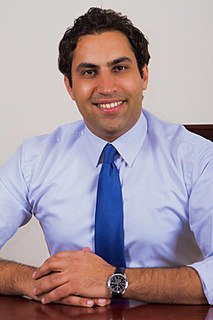
Ahmad Alhendawi currently serves as the Secretary-General of the World Organization of the Scout Movement, the youngest in the history of the organization. Prior to this, he was the first-ever United Nations Secretary-General's Envoy on Youth, appointed by the Secretary-General of the United Nations on January 17, 2013 as the youngest senior official in the history of the United Nations. He supported UN Secretary-General Ban Ki-moon in addressing his thematic priority of working with and for young people as part of his current Five-Year Action Agenda.
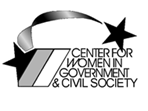
The Center for Women in Government & Civil Society (CWGCS) is a policy research center at the Rockefeller College of Public Affairs and Policy, University at Albany (SUNY). CWGCS was founded in 1978, and is a member organization of The National Council for Research on Women.
Nancy Okail is an Egyptian activist and a scholar with a focus in democracy and power relations of foreign aid. In 2013, Okail was sentenced in absentia to five years in prison in the controversial Egyptian court case against local and foreign non-governmental organization (NGOs).

Atiaf Zaid Al-Wazir is a researcher, human rights activist, citizen journalist and blogger and co-founder of the media advocacy group Support Yemen. Al-Wazir lived in Tunis, Tunisia then she is currently in Brussels, Belgium.

The Tahrir Institute for Middle East Policy (TIMEP) is a nonpartisan, nonprofit organization dedicated to raising awareness of democratic transitions in the Middle East through analysis, advocacy, and action.














